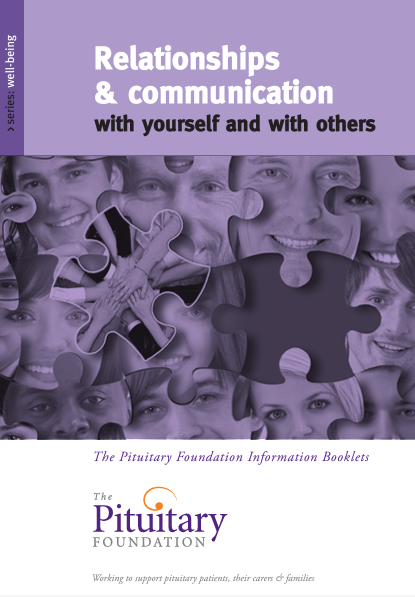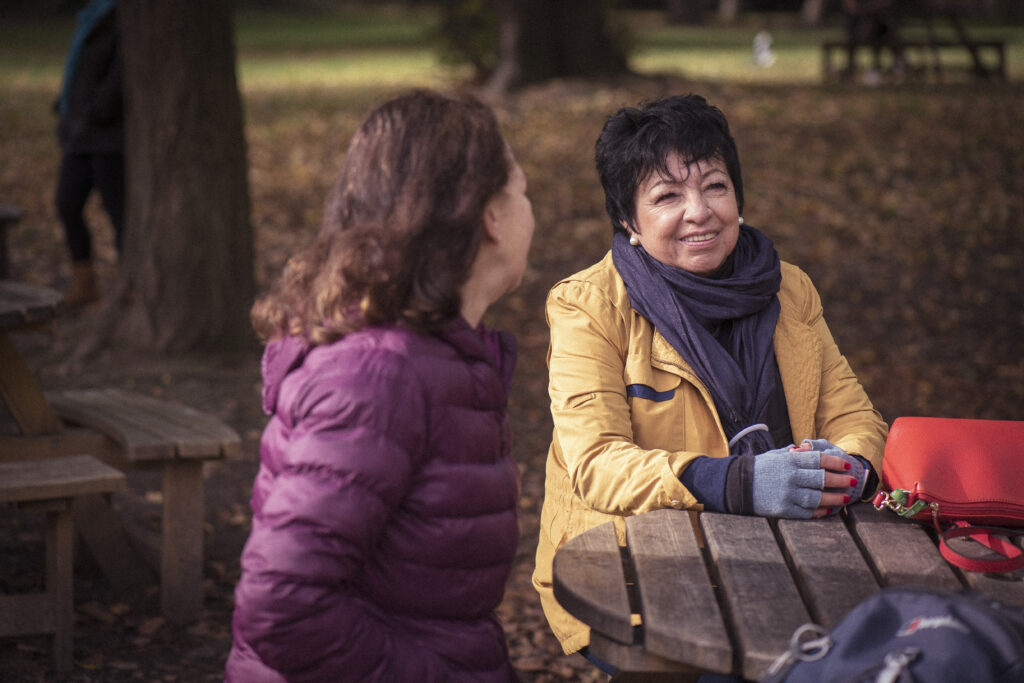Life with a pituitary condition can undermine your relationship with yourself, leading to low self-esteem, but what does that mean? What is self-esteem?
In this blog post, Dr Sue Jackson (Chartered Psychologist) explores self-esteem and the ways it can be impacted by a chronic health condition.
What is self-esteem?
According to Rosenberg (the author of one of the most used questionnaires designed to measure self-esteem), it is the word we use to describe and/or summarise our attitude towards ourselves. That attitude can be either positive or negative. I would add that it goes to the heart of what it means to be a person – the central beliefs we have about ourselves and the kind of person we each think we are or feel ourselves to be.
Definitions and descriptions of self-esteem

Before they started researching it, psychologists used to think that most people had good self-esteem. It came as something of a surprise to find that people with good, stable self-esteem (i.e., those who see themselves as good and worthwhile individuals pretty much all the time) are quite rare. For ease of reference, and because there are some misconceptions about what good self-esteem looks like, here’s a description. People with good, stable self-esteem are generally very comfortable with themselves, which makes them easy to be around, not least because you know where you stand with them. They love and accept themselves as they are, strengths and weaknesses included, although this doesn’t mean that they have an inflated opinion of themselves. They’re aware that they are human, that they make mistakes and get things wrong. They can accept constructive criticism without seeing it as a personal insult. Instead, they see it as information they can use to improve. They don’t feel the need to prove anything, which leaves them open to letting themselves have experiences from which they can learn without worrying what other people might think – they are simply willing to try things. They respect themselves, whilst also respecting others.
Over time it has become clear there are three different kinds of self-esteem:
- Good, stable self-esteem
- Chronically low self-esteem
- Variable or fluctuating self-esteem
Most people seem to have a good understanding of what poor self-esteem can be like and, when questioned about it, generally describe someone with negative and critical thoughts about themselves, troubled by uncertainty and self-doubt. That said, lots of people confuse self-esteem with confidence and assertiveness (I know I did when I was younger) and while it is closely related to both of those things, it isn’t the same thing.
Assertiveness is a social skill that relies heavily on effective communication. To be assertive means learning to honestly express your opinions, feelings, attitudes and rights, without feeling anxiety and fear, while at the same time acknowledging other people’s rights, thoughts and wishes. With a definition like that, it is easy to see why people think assertiveness and self-esteem are closely linked.
Meanwhile, confidence is the extent to which you are comfortable with the various skills you have. For example, there are some things that you are so confident at doing that you don’t even think about them as being skills anymore unless you must relearn them for some reason (for example, walking or making a drink). There are other skills where you are not so sure of your abilities and so you tend to think about them more, especially as regards your performance of them. For example, I’d say that I’m an OK cook but I’m aware that there’s a lot that I still don’t know how to do. Quite often people confuse what they can or can’t do with who they are and how they feel about themselves, which leads to fluctuating self-esteem. As an example, when they’re doing well they feel fine with themselves but if they make a mistake in performing a task, particularly if someone else points that out to them publicly, it can really dent their confidence. This can then lead to them having very self-critical thoughts and feeling bad about themselves.
Manifestations of low self-esteem
While most people find it very easy to describe low self-esteem, they may not be aware that it can manifest itself in several ways. There are those with low self-esteem who may wonder what use they are and who can end up feeling that the world would be better off without them in it. They can lack a sense of having any value as a person at all, feeling that others do not like them, love them or care about them. Despite this, they may be acutely sensitive to the needs of others and may put these needs above their own. Some people may go so far as to believe that the only time their presence is acceptable to other people is when they’re doing things for others – the idea of turning up empty-handed to someone else’s house for a cup of tea and a chat leaves them in a cold sweat. They may worry that they are unable to do things right or feel anxious if they are prevented from doing things for others, for example, because of ill-health.
Some people with low self-esteem dislike themselves so much it leads them to lash out and hurt others. Someone who is routinely very critical of others, who rarely has a good word to say about anyone, who always points out the errors you make but who is seemingly unable to give you any praise is quite possibly acting out of low self-esteem. Bullies quite often have low self-esteem and/or are very scared of other people. Their behaviour is an attempt to try and control others by cutting them down to size and keeping them off-balance.
Pituitary conditions and self-esteem
I think people with pituitary conditions can develop self-esteem problems partly because the various conditions, and their respective treatments, can change so much about what it means for them to be who they are. In short, some of the conditions cause changes to appearance and lots of the conditions cause problems with mood swings and emotional reactions. Many people may also struggle with fatigue and low energy, presenting them with difficult choices about what they can do, especially if the fatigue comes with brain fog and memory problems. All of this can leave someone feeling lost, unsure, worthless, hopeless and miserable.
Living with someone with a pituitary condition can trigger self-esteem issues for their support network too. Family members and friends can be surprised by their own reactions to living with someone with a long-term condition. It can be confusing, frustrating, and difficult – people report being surprised at how uncertain, worried, angry, and sad they feel. If this leads to arguments and unkind things being said and done, the shame and guilt can lead you to wonder just what kind of a person you really are.
Improving self-esteem
I would argue that the key to improving self-esteem is practising self-respect. There are many ways to do this so I usually suggest you pick one that looks the easiest to try and work on. For example, you could learn to listen to yourself – your opinions and emotions matter. They’re an important source of information about yourself and the world around you. People with low self-esteem often don’t treat themselves very well and the language they use towards themselves when they make mistakes is often foul and hurtful. Learning to treat yourself with patience and understanding could be an important first step for some people. Being polite towards ourselves is important for all of us, as research shows that the bad language and nasty names we employ towards ourselves cause stress and anxiety.
Some people might find it easier to start with attending to their physical needs as part of improving their self-esteem. This could look like taking a break when you’re feeling tired, having a drink when you’re feeling thirsty or looking after your nutritional needs appropriately.
If your self-esteem is very poor, it can feel terrifying to start to treat yourself with dignity and respect. You may have a very real fear that if certain people find out that you’re seeking to improve yourself they will slap you down. That fear can be so powerful that it can lead you to feel that it’s both easier and safer to stay as you are. To those people I would say two things. Firstly, it’s important to work on having some boundaries in your mind, such that you understand what is genuinely about you and what is someone else’s issue. And secondly, your relationship with yourself is allowed to be private. You’re allowed to talk to yourself kindly, to be loving and gentle towards yourself without telling anyone else that that’s what you’re doing. I often refer to improving self-esteem as something of a Secret Squirrel task, because it can be difficult for people to acknowledge or discuss with others.
Your relationship with yourself is allowed to be private. You’re allowed to talk to yourself kindly; to be loving and gentle towards yourself without telling anyone else that that’s what you are doing.
Sources of support
The relationship you have with yourself is arguably the only one that you will have that will last your whole life. If it’s a troubled relationship, it’s worth doing some work on it to try and improve it even though for lots of us that’s much easier said than done. To try and help, The Pituitary Foundation has a booklet called Relationships & Communication that starts out considering the relationship you have with yourself and how to improve, it if it isn’t good, before moving on to addressing relationships with other people.
It’s not unusual to need support to work on your self-esteem (I know I did when I was younger), so remember that The Pituitary Foundation has both telephone buddies and a helpline you can call, and they now have a new counselling service run by Rareminds.












